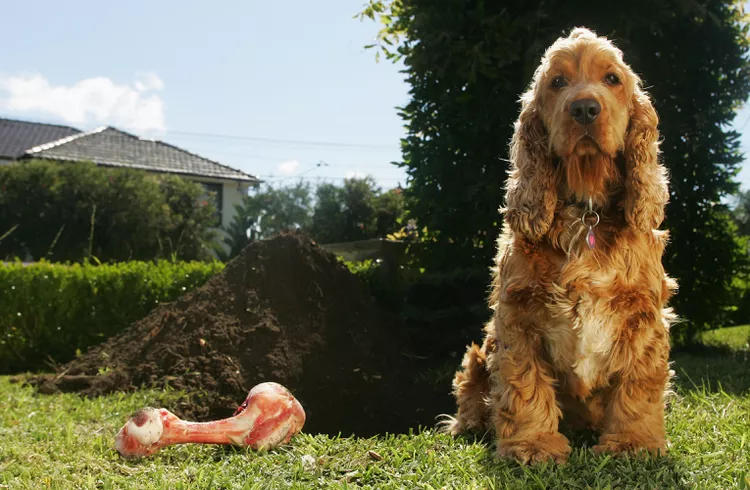- 01 of 08
High Prey Drive
All dogs, even the proverbial couch potatoes of the dog world, have a predatory instinct within them. It's why your dog loves to chew up their squeaky toys and chase squirrels on their walk. When your dog is exploring the yard, they may be hearing and smelling animals that are underground. Dogs with a high prey drive, especially terrier breeds, may take to digging in the yard in an attempt to get at the critters they hear and smell.
- 02 of 08
For Storage
Some dogs may have a strong instinct to cache things they value, such as food, bones, or even toys. They do this because they feel an instinct to hide things for safekeeping. Of course, you don't want their highly prized, highly chewed-up Nylabone, but your dog doesn't know that. Your dog just knows that they love the Nylabone and doesn't want anyone else to have it. As a result, a dog may start digging holes that serve as a place to hide a bone or toy.
- 03 of 08
To Cool Off
Anyone who has ever been inside an underground cave knows that it can be noticeably cooler even just a few feet below ground. If it's an especially warm day out, your dog may dig up your yard in order to get to some cooler soil and rest there. Nordic breeds, such as Malamutes, Huskies, and Elkhounds, are especially inclined to dig in the dirt to escape the heat.
- 04 of 08
To Warm Up
Conversely, your dog may try to dig up your yard in the winter to construct a dirt blanket, more or less. Dirt acts as great insulation, and holes are warm places to rest for your pups. If you notice this behavior, then reassess if it's warm enough for your dog to be outdoors.
Continue to 5 of 8 below - 05 of 08
Stress and Anxiety
There are several classic displacement behaviors dogs may exhibit when they are feeling stressed or anxious. If a stressed dog is pushed over a certain threshold, he or she may get so worked up with anxiety that it starts digging frantically in an effort to exert pent-up energy. This can be the case even if the perceived threat isn't a real threat at all.
- 06 of 08
Boredom
Dogs may get into the destructive mood if there's simply nothing else for them to do. Other signs of boredom in dogs include barking and chewing. Make sure your dog is getting enough physical exercise and mental stimulation to rule out boredom as the reason behind their digging.
- 07 of 08
To Escape
Sometimes, the grass is greener on the other side of the fence, and your dog wants to check it out by digging a tunnel over to your neighbor's yard. Most of the time, this is purely because of curiosity; the dog hasn't been told they can't try to escape, so they want to try it out.
- 08 of 08
To Prepare for Pregnancy
Nesting is a common behavior of pregnant female dogs right before they're about to give birth. This usually occurs indoors but can resemble digging or burrowing and is commonly accompanied by gathering blankets or pillows in order to make her nest more comfortable.
How to Stop Your Dog's Digging
Because digging is a deeply held instinct in your dog, you may not be able to stop it completely. Instead, most behaviorists and trainers agree that it is important to provide more appropriate outlets for your dogs digging and to address issues that would lead your dog to dig in the first place.
Provide Appropriate Outlets
For dogs with a high prey drive, such as Jack Russell Terriers, Yorkshire Terriers, Dachshunds, and other breeds that were originally meant to hunt small animals, the AKC Earthdog tests can be a great outlet. Unfortunately, only certain breeds are eligible for Earthdog events through the AKC specifically and these include most small to medium-sized terriers and the Dachshund. If your digging dog doesn't fit into this narrow category, there is still something you can do to provide an outlet for your pup. Giving your dog a sandbox (or sandpit, if they like to dig deep holes) can designate an area of your yard where he or she is allowed to dig. This can also be beneficial for dogs who like to dig to hide toys and snacks.
Rodent Control
Whether you desire to make your backyard a Certified Backyard Habitat or you prefer to enjoy nature from afar, it may be best to implement some rodent control if your dog likes to dig up your yard. There are several ways to make your yard undesirable for rodents. This can be as simple as planting fragrant herbs and plants, such as mint, basil, and thyme. Try to avoid using dirt mulch for flower beds as rodents like to burrow and nest in this. There are also solar-powered repellents that utilize sound and vibration to deter rodents, but depending on the frequencies these also may be a nuisance for your dog.
Provide Shady Areas
If your dog likes to dig up the yard only to lie in the upturned soil, they may appreciate a shady spot to lounge in. Providing a shady spot for your dog to get out of the direct sun can allow them to cool off without seeking out cool soil.
You may not ever stop your dog's desire to dig. That doesn't mean you have to constantly struggle with your dog making potholes in your yard. Providing outlets and controlling your dog's environment can better help prevent the destruction of your yard—and keep you both happy.




















